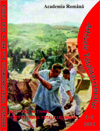
A Russian Diplomat in Bucharest: S.A. Poklevski-Koziell and the‘Bessarabian Cause’, 1919-1920
A Russian Diplomat in Bucharest: S.A. Poklevski-Koziell and the‘Bessarabian Cause’, 1919-1920
Keywords: Borderland; Bessarabia; Russian Whites; Romania; S.A. Poklevski-Koziell;
The article sheds light on the activity of the Russian ambassador to Bucharest, Stanislav A. Poklevski-Koziell, in the immediate period after World War I. The diplomat considered that the Bolshevik danger was a priority which should motivate the former war allies Romania and Russia to support each other, despite the dispute over Bessarabia. Poklevski believed in the return of the region back to Russia and, in the period when at the Paris peace conference the fate of the former Russia’s Western borderlands was decided, supported with materials the Russian political émigrés and diplomats as well the Bessarabians who propagated for the “Bessarabian cause”. At the same time, Poklevski opted for a more pragmatic behaviour of the Kolchak government in Romania. He believed that Denikin’s declaration on abstaining from any act of hostility toward Romania and compliance with the future decision of the Peace conference in regard to Bessarabia will ensure the support of Romania in the fight against the Bolsheviks.
More...